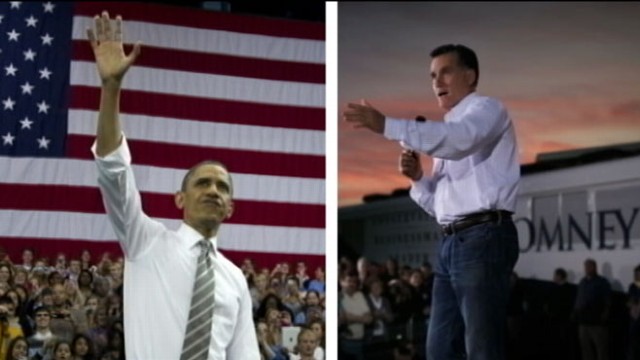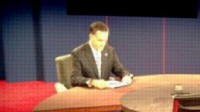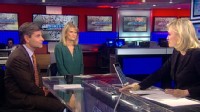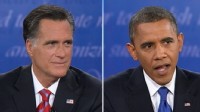Tonight's speech by Michelle Obama showed that it's not only the president with exception oratorical skill. Smooth and powerful, Michelle Obama articulated the vision for America she feels her husband brings to the table, and roused fellow Democratics at the Convention. Here is the transcript:
----------------
Michelle Obama speech at the 2012 Democratic National Convention:
Thank you so much, Elaine…we are so grateful for your family’s service and sacrifice…and we will always have your back.
Over the past few years as First Lady, I have had the extraordinary privilege of traveling all across this country.
And everywhere I’ve gone, in the people I’ve met, and the stories I’ve heard, I have seen the very best of the American spirit.
I have seen it in the incredible kindness and warmth that people have shown me and my family, especially our girls.
I’ve seen it in teachers in a near-bankrupt school district who vowed to keep teaching without pay.
I’ve seen it in people who become heroes at a moment’s notice, diving into harm’s way to save others…flying across the country to put out a fire…driving for hours to bail out a flooded town.
And I’ve seen it in our men and women in uniform and our proud military families…in wounded warriors who tell me they’re not just going to walk again, they’re going to run, and they’re going to run marathons…in the young man blinded by a bomb in Afghanistan who said, simply, “…I’d give my eyes 100 times again to have the chance to do what I have done and what I can still do.”
Every day, the people I meet inspire me…every day, they make me proud…every day they remind me how blessed we are to live in the greatest nation on earth.
Serving as your First Lady is an honor and a privilege…but back when we first came together four years ago, I still had some concerns about this journey we’d begun.
While I believed deeply in my husband’s vision for this country…and I was certain he would make an extraordinary President…like any mother, I was worried about what it would mean for our girls if he got that chance.
How would we keep them grounded under the glare of the national spotlight?
How would they feel being uprooted from their school, their friends, and the only home they’d ever known?
Our life before moving to Washington was filled with simple joys…Saturdays at soccer games, Sundays at grandma’s house…and a date night for Barack and me was either dinner or a movie, because as an exhausted mom, I couldn’t stay awake for both.
And the truth is, I loved the life we had built for our girls…I deeply loved the man I had built that life with…and I didn’t want that to change if he became President.
I loved Barack just the way he was.
You see, even though back then Barack was a Senator and a presidential candidate…to me, he was still the guy who’d picked me up for our dates in a car that was so rusted out, I could actually see the pavement going by through a hole in the passenger side door…he was the guy whose proudest possession was a coffee table he’d found in a dumpster, and whose only pair of decent shoes was half a size too small.
But when Barack started telling me about his family – that’s when I knew I had found a kindred spirit, someone whose values and upbringing were so much like mine.
You see, Barack and I were both raised by families who didn’t have much in the way of money or material possessions but who had given us something far more valuable – their unconditional love, their unflinching sacrifice, and the chance to go places they had never imagined for themselves.
My father was a pump operator at the city water plant, and he was diagnosed with Multiple Sclerosis when my brother and I were young.
And even as a kid, I knew there were plenty of days when he was in pain…I knew there were plenty of mornings when it was a struggle for him to simply get out of bed.
But every morning, I watched my father wake up with a smile, grab his walker, prop himself up against the bathroom sink, and slowly shave and button his uniform.
And when he returned home after a long day’s work, my brother and I would stand at the top of the stairs to our little apartment, patiently waiting to greet him…watching as he reached down to lift one leg, and then the other, to slowly climb his way into our arms.
But despite these challenges, my dad hardly ever missed a day of work…he and my mom were determined to give me and my brother the kind of education they could only dream of.
And when my brother and I finally made it to college, nearly all of our tuition came from student loans and grants.
But my dad still had to pay a tiny portion of that tuition himself.
And every semester, he was determined to pay that bill right on time, even taking out loans when he fell short.
He was so proud to be sending his kids to college…and he made sure we never missed a registration deadline because his check was late.
You see, for my dad, that’s what it meant to be a man.
Like so many of us, that was the measure of his success in life – being able to earn a decent living that allowed him to support his family.
And as I got to know Barack, I realized that even though he’d grown up all the way across the country, he’d been brought up just like me.
Barack was raised by a single mother who struggled to pay the bills, and by grandparents who stepped in when she needed help.
Barack’s grandmother started out as a secretary at a community bank…and she moved quickly up the ranks…but like so many women, she hit a glass ceiling.
And for years, men no more qualified than she was – men she had actually trained – were promoted up the ladder ahead of her, earning more and more money while Barack’s family continued to scrape by.
But day after day, she kept on waking up at dawn to catch the bus…arriving at work before anyone else…giving her best without complaint or regret.
And she would often tell Barack, “So long as you kids do well, Bar, that’s all that really matters.”
Like so many American families, our families weren’t asking for much.
They didn’t begrudge anyone else’s success or care that others had much more than they did...in fact, they admired it.
They simply believed in that fundamental American promise that, even if you don’t start out with much, if you work hard and do what you’re supposed to do, then you should be able to build a decent life for yourself and an even better life for your kids and grandkids.
That’s how they raised us…that’s what we learned from their example.
We learned about dignity and decency – that how hard you work matters more than how much you make…that helping others means more than just getting ahead yourself.
We learned about honesty and integrity – that the truth matters…that you don’t take shortcuts or play by your own set of rules…and success doesn’t count unless you earn it fair and square.
We learned about gratitude and humility – that so many people had a hand in our success, from the teachers who inspired us to the janitors who kept our school clean…and we were taught to value everyone’s contribution and treat everyone with respect.
Those are the values Barack and I – and so many of you – are trying to pass on to our own children.
That’s who we are.
And standing before you four years ago, I knew that I didn’t want any of that to change if Barack became President.
Well, today, after so many struggles and triumphs and moments that have tested my husband in ways I never could have imagined, I have seen firsthand that being president doesn’t change who you are – it reveals who you are.
You see, I’ve gotten to see up close and personal what being president really looks like.
And I’ve seen how the issues that come across a President’s desk are always the hard ones – the problems where no amount of data or numbers will get you to the right answer…the judgment calls where the stakes are so high, and there is no margin for error.
And as President, you can get all kinds of advice from all kinds of people.
But at the end of the day, when it comes time to make that decision, as President, all you have to guide you are your values, and your vision, and the life experiences that make you who you are.
So when it comes to rebuilding our economy, Barack is thinking about folks like my dad and like his grandmother.
He’s thinking about the pride that comes from a hard day’s work.
That’s why he signed the Lilly Ledbetter Fair Pay Act to help women get equal pay for equal work.
That’s why he cut taxes for working families and small businesses and fought to get the auto industry back on its feet.
That’s how he brought our economy from the brink of collapse to creating jobs again – jobs you can raise a family on, good jobs right here in the United States of America.
When it comes to the health of our families, Barack refused to listen to all those folks who told him to leave health reform for another day, another president.
He didn’t care whether it was the easy thing to do politically – that’s not how he was raised – he cared that it was the right thing to do.
He did it because he believes that here in America, our grandparents should be able to afford their medicine…our kids should be able to see a doctor when they’re sick…and no one in this country should ever go broke because of an accident or illness.
And he believes that women are more than capable of making our own choices about our bodies and our health care…that’s what my husband stands for.
When it comes to giving our kids the education they deserve, Barack knows that like me and like so many of you, he never could’ve attended college without financial aid.
And believe it or not, when we were first married, our combined monthly student loan bills were actually higher than our mortgage.
We were so young, so in love, and so in debt.
That’s why Barack has fought so hard to increase student aid and keep interest rates down, because he wants every young person to fulfill their promise and be able to attend college without a mountain of debt.
So in the end, for Barack, these issues aren’t political – they’re personal.
Because Barack knows what it means when a family struggles.
He knows what it means to want something more for your kids and grandkids.
Barack knows the American Dream because he’s lived it…and he wants everyone in this country to have that same opportunity, no matter who we are, or where we’re from, or what we look like, or who we love.
And he believes that when you’ve worked hard, and done well, and walked through that doorway of opportunity…you do not slam it shut behind you…you reach back, and you give other folks the same chances that helped you succeed.
So when people ask me whether being in the White House has changed my husband, I can honestly say that when it comes to his character, and his convictions, and his heart, Barack Obama is still the same man I fell in love with all those years ago.
He’s the same man who started his career by turning down high paying jobs and instead working in struggling neighborhoods where a steel plant had shut down, fighting to rebuild those communities and get folks back to work…because for Barack, success isn’t about how much money you make, it’s about the difference you make in people’s lives.
He’s the same man who, when our girls were first born, would anxiously check their cribs every few minutes to ensure they were still breathing, proudly showing them off to everyone we knew.
That’s the man who sits down with me and our girls for dinner nearly every night, patiently answering their questions about issues in the news, and strategizing about middle school friendships.
That’s the man I see in those quiet moments late at night, hunched over his desk, poring over the letters people have sent him.
The letter from the father struggling to pay his bills…from the woman dying of cancer whose insurance company won’t cover her care…from the young person with so much promise but so few opportunities.
I see the concern in his eyes...and I hear the determination in his voice as he tells me, “You won’t believe what these folks are going through, Michelle…it’s not right. We’ve got to keep working to fix this. We’ve got so much more to do.”
I see how those stories – our collection of struggles and hopes and dreams – I see how that’s what drives Barack Obama every single day.
And I didn’t think it was possible, but today, I love my husband even more than I did four years ago…even more than I did 23 years ago, when we first met.
I love that he’s never forgotten how he started.
I love that we can trust Barack to do what he says he’s going to do, even when it’s hard – especially when it’s hard.
I love that for Barack, there is no such thing as “us” and “them” – he doesn’t care whether you’re a Democrat, a Republican, or none of the above…he knows that we all love our country…and he’s always ready to listen to good ideas…he’s always looking for the very best in everyone he meets.
And I love that even in the toughest moments, when we’re all sweating it – when we’re worried that the bill won’t pass, and it seems like all is lost – Barack never lets himself get distracted by the chatter and the noise.
Just like his grandmother, he just keeps getting up and moving forward…with patience and wisdom, and courage and grace.
And he reminds me that we are playing a long game here…and that change is hard, and change is slow, and it never happens all at once.
But eventually we get there, we always do.
We get there because of folks like my Dad…folks like Barack’s grandmother…men and women who said to themselves, “I may not have a chance to fulfill my dreams, but maybe my children will…maybe my grandchildren will.”
So many of us stand here tonight because of their sacrifice, and longing, and steadfast love…because time and again, they swallowed their fears and doubts and did what was hard.
So today, when the challenges we face start to seem overwhelming – or even impossible – let us never forget that doing the impossible is the history of this nation…it’s who we are as Americans…it’s how this country was built.
And if our parents and grandparents could toil and struggle for us…if they could raise beams of steel to the sky, send a man to the moon, and connect the world with the touch of a button…then surely we can keep on sacrificing and building for our own kids and grandkids.
And if so many brave men and women could wear our country’s uniform and sacrifice their lives for our most fundamental rights…then surely we can do our part as citizens of this great democracy to exercise those rights…surely, we can get to the polls and make our voices heard on Election Day.
If farmers and blacksmiths could win independence from an empire…if immigrants could leave behind everything they knew for a better life on our shores…if women could be dragged to jail for seeking the vote…if a generation could defeat a depression, and define greatness for all time…if a young preacher could lift us to the mountaintop with his righteous dream…and if proud Americans can be who they are and boldly stand at the altar with who they love…then surely, surely we can give everyone in this country a fair chance at that great American Dream.
Because in the end, more than anything else, that is the story of this country – the story of unwavering hope grounded in unyielding struggle.
That is what has made my story, and Barack’s story, and so many other American stories possible.
And I say all of this tonight not just as First Lady…and not just as a wife.
You see, at the end of the day, my most important title is still “mom-in-chief.”
My daughters are still the heart of my heart and the center of my world.
But today, I have none of those worries from four years ago about whether Barack and I were doing what’s best for our girls.
Because today, I know from experience that if I truly want to leave a better world for my daughters, and all our sons and daughters…if we want to give all our children a foundation for their dreams and opportunities worthy of their promise…if we want to give them that sense of limitless possibility – that belief that here in America, there is always something better out there if you’re willing to work for it…then we must work like never before…and we must once again come together and stand together for the man we can trust to keep moving this great country forward…my husband, our President, President Barack Obama.
Thank you, God bless you, and God bless America.




